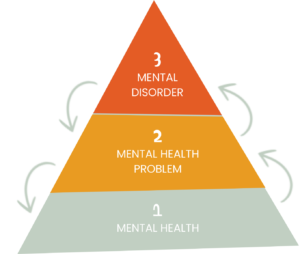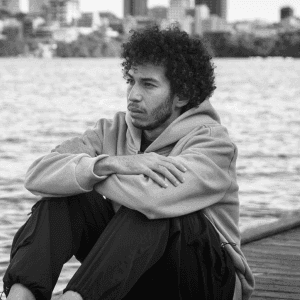
Have you noticed that often we only talk about mental health when it is related to a problem? However, mental health does not just mean absence of illness. On the contrary, it is a dynamic state that involves feeling, thinking and acting in the face of everyday challenges.
Just to give you an idea, mental health cuts across all aspects of our lives. In other words, it influences emotional balance, how we deal with stress and how we build self-esteem. It also has an impact on relationships and performance in studies and at work. It also interferes with decisions, adapting to change and even maintaining healthy habits. Thus, taking care of your mind is not a luxury, but a necessity.
Mental Health and Socio-Emotional Skills
All emotions – pleasant or not – are part of the human experience and play an adaptive role. However, the expectation of always being happy, coupled with the tendency to deny one’s own feelings, often leads to frustration.
So the secret to escaping this trap is to first recognize, accept and deal with the most difficult emotions. This way, we can pave the way for greater mental balance.
In this respect, socio-emotional skills are essential. This is because, as well as helping people to cope with different emotional states, they also contribute to overcoming challenges and fostering social relationships.
If you want to know more about socio-emotional competencies, follow videocast #24 on this topic or access our Socio-emotional Learning Handbook.
The Brain and Mental Health: How They Are Connected
The brain is a network of billions of neurons that communicate via electrical impulses and neurotransmitters. But this kind of complex functioning does not occur in a vacuum. That is, whenever it regulates thoughts and behavior, the brain is influenced not only by biological factors, but also by environmental elements.
In addition, thanks to its neuroplasticity, the brain has the capacity to reorganize itself and create new pathways, whether through psychotherapy, the adoption of healthy habits or even the use of medication when necessary.
Protective Factors: Basic Care
Taking care of your mind requires consistency and daily attention. Thus, to prevent problems or support treatment, start with the basics. This means maintaining good habits, as for example:
- Sleep: adhere to fixed schedules and avoid screens before bedtime, as they interfere with rest. Also, to balance your well-being throughout the day, take advantage of the morning sun.
- Movement: walk, stretch, dance or play sports, as the active body releases neurotransmitters that regulate mood.
- Diet: plan your meals and remember that the gut and the brain are directly connected.
- The Human Connection: make time to be with people you like.
- Bonds of Trust: practice both listening and honest conversations.
- Breaks and Leisure: include art, music and reading in your routine. Also, set aside time to connect with nature, a powerful source of well-being and balance.
- Digital Boundaries: minimize notifications and schedule regular offline time. This way, you ensure space for rest and mindfulness.
Do you want to know more about protective habits:
click here
How to Prevent Mental Disorders?
As half of all mental disorders usually show their first signs in childhood or adolescence, it is essential to take care of mental health from an early age.
At the same time, it is important to understand the concept of spectrum, since mental health is not something fixed. In fact, it manifests itself along a line extending from full health to the presence of a disorder. To make it easier to understand, take a look at the diagram below:

1
Sadness, anxiety, fear, tension.
Suffering: mild
Impact: small, proportional
Duration: short
2
Insomnia, irritability, tension, fear.
Suffering: moderate
Impact: moderate
Duration: medium, self-limiting
3
Repetitive symptoms, cannot be overcome.
Suffering: great
Impact: great
Duration: prolonged
To find out more about “What is Mental Health?”, visit our factsheet.
In addition to understanding how this works, it is also important to remember that mental health is directly related to well-being on a daily basis. That is why observing the signs that something is not right makes all the difference. And if they last for weeks or start to disrupt your routine, it is time to seek professional help.
With this in mind, we have put together some of the signs that may indicate emotional distress – either in you or in someone close to you:
- Irregular sleep, constant fatigue, headaches and muscle tension;
- Forgetfulness, difficulty concentrating and a drop in performance;
- Irritability and outbursts of anger;
- Isolation, apathy, loss of interest;
- Changes in appetite and weight;
- Hopelessness or thoughts of death.
Mental Health in Numbers
Mental health is one of the biggest challenges of our time. In fact, the fast pace of life, the excessive screen time, the pressure for productivity, economic instability and intolerance in various forms – such as bullying, prejudice and racism – make the scenario even more serious.
Anxiety:
Brazil leads the global ranking, with over 18 million people affected – about 9.3% of the population.
Depression:
5.8% of the Brazilian population — around 11.5 million people — suffer from depression, reaching the highest rate in Latin America.
Absences from Work:
By way of illustration, in 2024 sick leave reached its highest level in the last decade, with an increase of 67% compared to 2023, totaling almost half a million leaves.
Overall Global Ranking:
Today, Brazil ranks the 4th worst globally in overall mental health. Around 34% of the population reports stress and emotional problems. Among these individuals, young people under the age of 35 appear to be the most affected, pointing to a particularly vulnerable generation.
Children and Youth Mental Health
One in seven young people between the ages of 10 and 19 lives with a mental disorder. Among these cases, the most common are depression, anxiety, ADHD, and ODD. In addition, in Brazil, for the first time, anxiety among children and adolescents has exceeded that of adults.
Another worrisome statistic concerns suicide rates, which indicate growing vulnerability. To give you an idea, between 2011 and 2022, there was an average increase of 6% per year, while reports of self-harm among young people aged 10 to 24 grew even more, by around 29% per year over the same period.
In this context, it is essential that family, school and society work together to offer a welcoming environment. In this respect, the earlier the support arrives, the greater the chances of promoting quality of life and healthy development.
Mental Health and Stigma
Stigma remains one of the biggest obstacles to mental health, as it steers many people away from professional care. In addition, according to WHO data, lack of information, impediments to access and other social barriers contribute to around 85% of the mental disorders that go untreated. As a result, diagnosis is usually delayed by an average of eight years.
In any event, it is important to remember that mental disorders are neither weakness nor drama. On the contrary, they are conditions that involve alterations in brain function and, consequently, can compromise both cognitive and emotional abilities. In addition, these conditions have different causes, as they result from a combination of genetic, social and behavioral factors.











